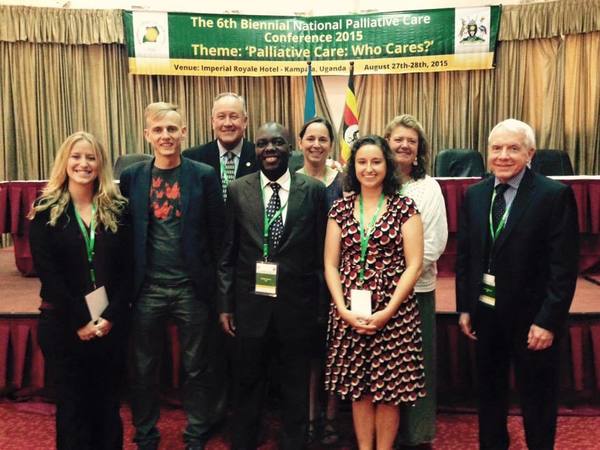Brianna Wanlass, ‘15 MS, was invited to present her 2015 University of Notre Dame’s Master of Science in Global Health Capstone Research Project, “Developing a Surveillance System to Support and Strengthen Palliative Care Services in Uganda”, at the 6th Biennial Palliative Care Conference in Kampala, Uganda, on August 27-28, 2015. While at Notre Dame she worked under Professor Lacey Ahern, Associate Director of Global Health Training.

Wanlass conducted her capstone research project in Uganda with the Palliative Care Association of Uganda (PCAU). PCAU is a long-standing partnership with the University working on projects with the Eck Institute for Global Health’s research programs and the Kellogg Institute for International Studies. Notre Dame’s Professor Ahern has worked with PCAU since 2009 when the organization was brought to her attention by the Center for Hospice Care in Mishawaka. As part of Global Partners in Care (formerly FHSSA) Partnership Initiative, Center for Hospice Care (CHC) was linked with Palliative Care Association of Uganda (PCAU) in 2008. Her work has furthered the mission of the PCAU.
Working with CHC, Ahern helped organize internships in Uganda for Notre Dame students in palliative and spiritual care. With the support of the Kellogg Institute for International Studies and the Ford Family Program in Human Development Studies and Solidarity, Hanna O’Brien, a College of Science Pre-Professional Studies and Anthropology double major at Notre Dame, was the first palliative care student to study in Uganda the summer of 2010. She returned in the summer of 2011. The Eck Institute for Global Health also helped fund spiritual care internships for Notre Dame Master of Divinity students Ben and Mary Ann Wilson in 2011. Other students and faculty have contributed to additional projects.
In addition, Brianna Kunycky, working at Notre Dame’s Geospatial Analysis Laboratory under the direction of Dr. Dilkushi Pitts, created a new palliative care map that depicts the current geographic deployment of palliative care workers throughout Uganda. Her work helped to identify coverage gaps and aid in prioritizing those areas of the country that are most in need of certified palliative care workers.
In the summer of 2013, Master of Science in Global Health student, Gaby Austgen interned in Uganda with PCAU. Austgen helped lay the groundwork for regular monitoring and communication between palliative care providers and support organizations like PCAU. Austgen said of the experience, “I’ve been aware of the existence of inequities in healthcare for a long time; seeing these situations in person somehow made them much more real…We cannot allow the fact that a life can no longer be ‘saved’ to remove that life from our care and consideration. We owe it to our neighbors to help them die peacefully – without the burden of physical, mental, or spiritual anguish.”
Uganda has made tremendous strides in the provision of palliative care services throughout the country, due largely to the efforts of PCAU particularly its advocacy efforts. PCAU is now mandated by the Ministry of Health with providing leadership and coordination for scale-up of palliative care services in Uganda. PCAU identified the need to regularly collect information to help strengthen and support palliative care services throughout Uganda and asked ND for help. Wanlass and PCAU piloted an mHealth platform to gather regular information from palliative care workers at facilities in four different regions of Uganda. The phones collected accurate GPS data, basic information on services offered and utilized, and patient data. This early pilot showed promising results for collecting and monitoring palliative care services throughout the community. Easily accessible information like this will allow the Ministry of Health, PCAU, health care facilities, and others to make evidence-based decisions on care they provide. Overall, the participants and PCAU enthusiastically accepted and appreciated the implementation of the mHealth surveillance system.
“In the field of global health there is a tendency to focus on preventative and curative measures. This leaves little attention paid to those facing life-limiting illnesses or those at the end-of-life,” states Wanlass. “Palliative care aims to improve the lives of these individuals through offering holistic care to the patient.”
At the conference, Wanlass had the opportunity to meet with the pilot implementation team and conduct follow-up trainings with them and with PCAU staff members. The project is continuing at the pilot sites and planning for scaling out to new facilities by next summer.
“Sharing this research from my Notre Dame capstone project with the hundreds of conference attendees will allow participants from other countries to use a similar mHealth solution in their own work in palliative care throughout Sub-Saharan Africa,” added Wanlass.
The Master of Science in Global Health program plans to continue working with CHC and PCAU by contributing student and faculty research support.
The Eck Institute for Global Health is a university-wide enterprise that recognizes health as a fundamental human right and endeavors to promote research, training, service to advance health standards for all people, especially people in low and middle-income countries, who are disproportionately impacted by preventable diseases. For more information about Notre Dame’s Master of Science in Global Health degree program, visit: here.
PHOTO: Wanlass far left.